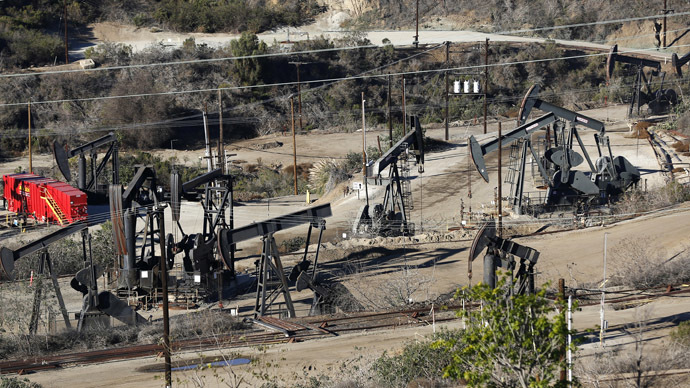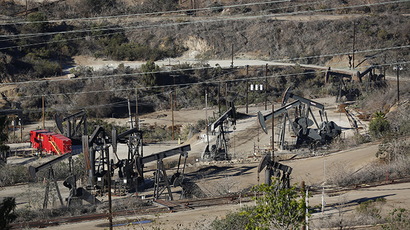Fracking moratorium fails in California despite strong public support

The California Senate killed a bill that would enact a moratorium on hydraulic fracturing - or fracking - in the state. The ban’s proponents blame lobbying by the oil industry, which spent nearly $1.5 million in three months fighting the bill.
The proposed legislation, introduced by Democratic state Sens. Holly J. Mitchell and Mark Leno, would have prohibited all well stimulation treatments (which includes fracking) until a scientific study evaluated all health and environmental effects for both onshore and offshore drilling. It would have also forced the state’s Natural Resources Agency to create fracking regulations.
The bill was defeated when four of 24 Democrats joined all 12 Republicans senators in voting “nay,” while three other Democrats abstained, preventing the moratorium from gaining a majority. The loss comes even though two-thirds of voters in the Golden State said they supported the ban, and a majority of voters said they would be “more likely” to vote for a legislator who supported it as well, a recent survey on the issue by Fairbank, Maslin, Maullin, Metz & Associates found.
“This is the second time a house of the California state legislature has soundly rejected a moratorium on a routine practice that’s been deemed safe repeatedly,” Dave Quast, California director of Energy in Depth, an oil industry-backed group, told Reuters.
He said fracking in California creates jobs, increases state revenue and lessens the state’s dependence on oil imports.
The oil lobby, led by the Western States Petroleum Association (WSPA), spent nearly $1.5 million in California during the first three months of 2014 alone, Truth Out reported. Altogether the industry spent more than $56 million on lobbying the California Legislature from 2009 through 2013. Californians Against Fracking estimated that oil lobbyists spent $15 million solely on defeating the bill.
"The overwhelming majority of Californians who support a moratorium on fracking will not stop fighting fracking and the public health risks, earthquakes, and climate change linked to this toxic extraction process," Zack Malitz of California-based progressive group Credo told Reuters.
Fracking opponents called the four Democrats who voted to block the ban “shamelessly unprincipled,” according to Reuters. The Sacramento Bee noted that the four are known to be “business-friendly.”
Republican lawmakers, who voted unanimously against the moratorium, said the state approved a fracking study last year with the understanding that the oil industry’s activity would be closely monitored until the study is complete, the Los Angeles Times reported.
“In Kern County, we have been safely fracking for decades,” GOP Sen. Andy Vidak told the Times. “[The moratorium] would lead to a heavy reduction of jobs.”
Jobs may not have been the only economic loss the state would have faced with a ban. According to a state Senate Appropriations fiscal summary of the bill, a fracking moratorium would cost California “at least in the mid-tens of millions” of dollars in lost revenue. However, the state will already be missing out on projected fracking revenue because of downgraded estimates of the Monterey Shale’s productivity.
Last Thursday, the US Energy Information Administration (EIA) cut the Monterey Shale oil formation estimate by 96 percent to just 600 million barrels from 13.7 billion, due to a lack of extraction technology. That amount of oil is only enough to meet U.S. oil consumption for 32 days, Think Progress reported. Supporters argued that the new estimates were precisely why bill needed to pass.
“There's not going to be a giant oil boom in California's near future, and the state, as a result, is not going to add 2.8 million new industry jobs or see its tax revenue increase by $24.6 billion annually, as oil and gas interests had claimed,” Robert Gammon wrote in an East Bay Express op-ed. “In fact, there's likely not going to be a boom at all. And so, if the state were to enact a ban on fracking now, it probably would have little to no impact on California's economy.”
“As such, there's no reason for the governor and lawmakers to continue to back a controversial practice that involves shooting massive amounts of water and toxic chemicals deep into the earth and has been linked to groundwater and air pollution and to earthquakes,” the Express editor argued. “In short, it's long past time for state lawmakers and the governor to catch up to the general public. California doesn't need to be fracked.”
Gov. Jerry Brown (D-Calif.) could halt fracking via executive order, but Reuters notes, “The odds of that happening are slim.” Brown has said multiple times, including earlier in May, that fracking is good for the state. In the meantime, localities, including the city of Beverly Hills and Santa Cruz County, have enacted bans. Other areas of the state are mulling regional bans as well.














